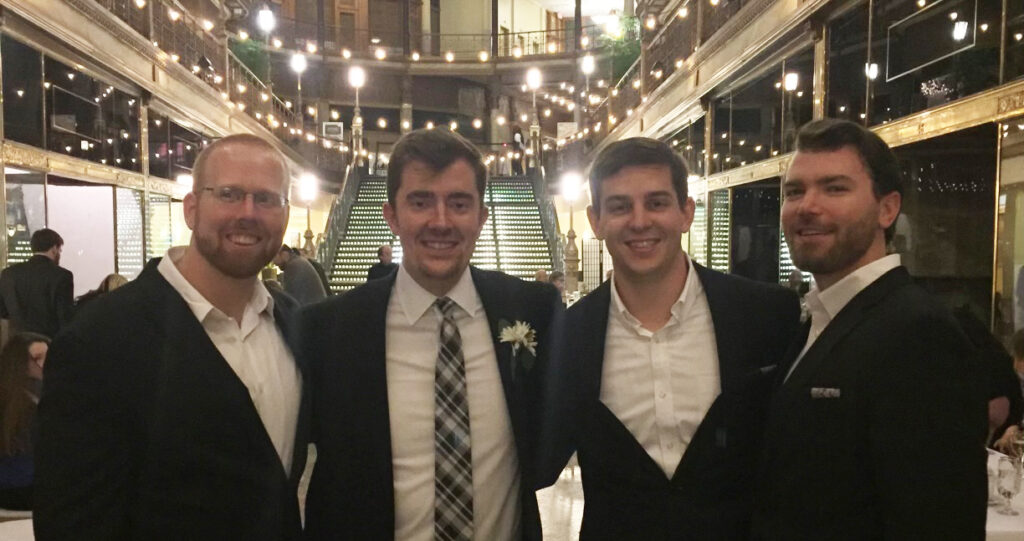Phil Smith ’10 Talley Center Endowment reaches $25,000
4 min read
From left: Jeremy Wood, Jonathan Wigginton, Phil Smith and Jake Kelly at Wigginton's wedding. | giving.umw.edu
by JESS KIRBY
Editor-in-Chief
The Phil Smith ‘10 Talley Center Endowment, created by friends of Smith, a class of 2010 alum who took his own life in October of 2020, is working to bolster mental health programs and resources for students at UMW. On Nov. 15, just over one year after its creation, the endowment met its five-year funding goal of $25,000.
“Our goal for the endowment was at least two-fold: create a lasting memory for our college roommate and friend, Phil—and, help provide mental health resources for the UMW student base to call upon when in need,” said Smith’s friends, UMW alumni Jake Kelly, Jeremy Wood and Jonathan Wigginton, and wife, Ashley Guzzetta. They answered The Weekly Ringer’s interview questions together via email.
The endowment, created by Kelly, Wood and Wigginton, will be used in various ways, all with the aim of supporting students’ mental health and honoring Smith.
“The endowment will support education, programming and counseling services to promote suicide prevention and mental health awareness,” said Lee Ann Reaser, director of advancement services. The funds may also be applied toward hosting guest speakers, conferences and Talley Center workshops, as well as any other programs or services dedicated to students’ mental health.
According to Reaser, $25,000 is the minimum amount needed to create an endowment. Once that funding is secured, “a portion of the income is paid out every year, based on the purpose specified by the donor,” she said.
After graduating from UMW in 2010 with a degree in business and accounting, Smith, a licensed certified public accountant, opened his own tax consulting firm in Raleigh, N.C., where he lived with his wife and two children.
“We would describe Phil as an intelligent, thoughtful, funny, and trustworthy friend,” his friends and wife said. “We’d like the UMW community to know that Phil would always be down for friendly competitions, live sporting events, and general shenanigans.”
Friends with Smith since their first week of classes, Kelly, Wood and Wigginton knew they wanted to do something to honor Smith and give him a lasting legacy at UMW. When they initially connected with the Office of University Advancement, they intended to name a bench in Smith’s memory.
“But we also knew/felt there was a more meaningful and impactful way to honor him,” they said.
Reaser had just the idea.
“I suggested the idea of supporting the Talley Center, and set up a Zoom call with Talley Center Director Tevya Zukor so they could learn more about the Talley Center and how an endowment could enhance and expand programs and resources to educate students on mental health and suicide prevention,” said Reaser.
After discussing with each other and with UMW, Kelly, Wood and Wigginton decided to create the endowment.
“We knew that was the direction we needed to go,” they said. “With a lot of guidance from Lee Ann and Tev, we pivoted in a way that could have a lasting effect in helping provide UMW students with mental health resources more directly.”
The Office of University Advancement then worked with them to meet the $25,000 minimum, which included promoting the endowment on April 13, 2021, last year’s Giving Tuesday.
“Betty Dobbins Talley ‘68, who gave the gift to name the Talley Center in 2014, sponsored a dollar-for-dollar match on all gifts received for Phil’s endowment on that day, up to $5,000,” said Reaser.
Then, in mid-November of this year, the endowment hit its $25,000 fundraising goal years early.
“Having that translate into immediate implementation of those funds is more than we could have imagined and [we] are forever grateful to all those who contributed,” Kelly, Wood, Wigginton and Guzzetta said.
During orientation this August, Wigginton and Kelly spoke to incoming students to share Smith’s story, emphasize the importance of mental health and highlight how the Talley Center can be a valuable resource.
“It was really kind of a powerful way to highlight the importance of mental health for our incoming students,” said Tevya Zukor, director of the Talley Center. “It was also the first time the university had been able to give us so much time to speak to all the incoming freshmen.”
They plan to speak at next year’s orientation, too.
“The COVID pandemic has reminded us of the importance of relationships in life,” Kelly, Wood, Wigginton and Guzzetta said. “For whatever reason, Phil wasn’t comfortable sharing his mental health struggles with his closest college friends. Check in on your friends, family, and loved ones—you never know the extent to which folks might be struggling.”
Lauren Albert contributed to reporting for this article.


